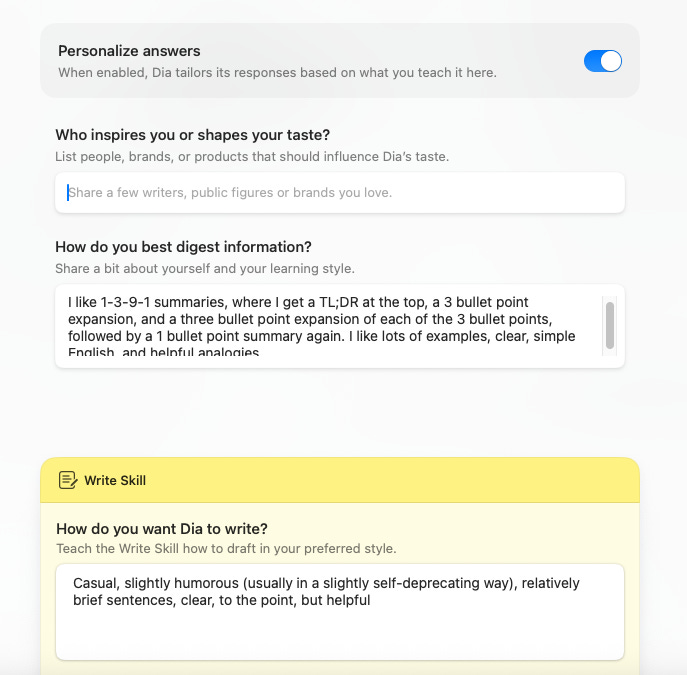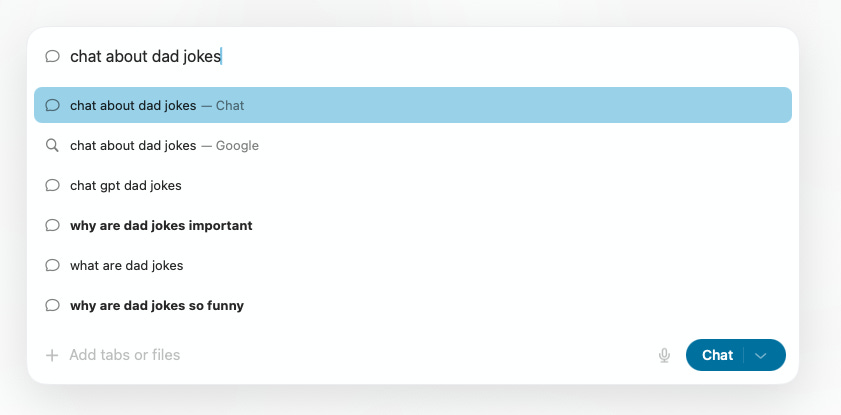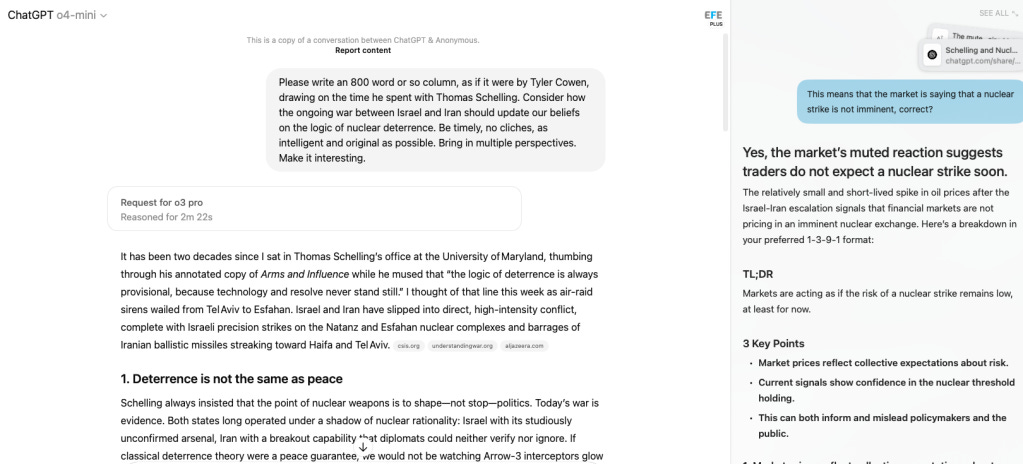Say Hello to AI-First Browsers
We were watching Rock On! the other day with our daughter, and a scene came up involving a cassette player and a cassette. I cannot remember the exact scene right now, but I do remember the conversation that followed between us (the dinosaurs) and our not-so-little one about how we used to listen to songs on cassettes.
(We then segued into a discussion about DVD players, until we realized that our daughter had never seen one of those things in her life. We then went back to watching the movie. So it goes.)
Future generations are going to look back at this time and have the same sense of pitying wonder. For we will be the generation that visited a tab on their browsers to talk with AI by typing into a little chat-box.
"How delightfully quaint", they'll say (or think or ESP-ize, or however it is that these future generations will communicate with each other).
And the reason they'll do all that is because we will in short order graduate from such primitive methods of communication with AI. And the first stop on that particular train-ride is called AIBrowserville.
And we're here already.
Dia Jalao
For a little less than a day now, I have been playing around with a new browser called Dia. Dia is the latest product from the stables of a company called (really) The Browser Company, and the idea is to bring the capabilities of the AI chatbot out from the little box, and put it front and center.
AI, in Dia, isn't a tab that you visit. It is, in a sense, the entire browsing experience.
When you open a new tab in Dia, you get (a lot!) of white space:
You can @ a tab that is already open, or multiple ones. You can use "skills" like /write, or /code, which allow you to do repetitive tasks quickly. For example, you can quickly draft a typical email (maybe your deliverable will be a little late, and you need to explain by how much and why), or you can have a certain snippet of code be churned out very quickly.
But better still, you can just start typing what you want to in the box, and the browser understands what you want to do. It figures out whether you need to visit a website (in which case it will autocomplete your attempt and just take you to that website), or you want to chat about something, like so:
That first option there, which ends in " - Chat", is the Browser implementation of its AI layer, and they have decided to not bother trying to come up with their own model:
Rather than try to build one all-purpose chatbot like Gemini, or ask you to choose between a million purpose-built models like ChatGPT, The Browser Company has invested a lot in what Agrawal calls “the routing system.” Dia mostly doesn’t run on its own models, and after months of trying, The Browser Company has given up on trying to compete in that space. Instead, the company is building what it calls “skills” on top of existing models, helping combine prompts and models to match your needs to the right tools. “And crucially,” Agrawal says, “we can have custom UI and custom memory systems for each skill.”
When you ask Dia to find you a coat, the assistant might activate a shopping skill, which knows all the stuff you’ve been looking at from Amazon and Anthropologie; when you ask it to draft an email, a writing skill can see both all the emails you’ve written and the authors you love reading.
And when you chat with the AI layer, you can tell it how you'd like it to, well, chat:

So What Does It Do, Really?
So how does browsing "work" in such an implementation?
Tyler Cowen shared a link to an essay written by o3 Pro on the Iran-Israel war, and as you might imagine, I had lots of questions while reading it. What you need to do is click on the little blue button at the top right, and a side-panel pops up, where you can have a chat with it as you read the piece:
You can choose to chat with multiple tabs at the same time by using the @ feature and mentioning the various tabs you want to reference in the chat, and you can also choose to highlight specific sentences across all of those tabs.
So if you (like me) would like an implementation where chatting with AI becomes as low-friction as possible while you are reading, this is a fairly good start.
The Dia browser is, for now, invite-only, and you need a macOS with at least an M1 chip. But if you meet those requirements, this is worth trying out, for sure.
Some Reflections
Here are some quick points I cannot help but think about while thinking about where (and how) this is going to go:
An AI-first browser "works" by removing the friction associated with most of the tasks within a browser where AI can make the task better, or faster, or cheaper (or all of the above). Which tasks that we typically do in a browser are best suited for AI assistance (or outright outsourcing)? Which tasks are now very much within the realm of possibility?
Won't this work better if it is a browser developed by (say) ChatGPT or if Chrome bakes some of this in? Given how much both Google and OpenAI know (Google knows pretty much everything about what I do online, and ChatGPT knows much of what I do with AI), won't that work much better than what Dia is able to offer now? (Spoiler: yes, and yes)
Er, this is just the beginning, right? There are insane capabilities that must be on their way? Yessir, and for a small preview, consider this:
"The third thing browsers have going for them is slightly less obvious but maybe even more powerful: cookies. Since Dia stores the cookies you get from every website on the web, it is effectively able to interact with all those websites on your behalf. That means Dia doesn’t just see every webpage you visit — it can see everything in every site you’re logged into.
Right now, Agrawal says, Dia mostly uses cookies to grab more information from websites you visit, but it could do much more. Someday, in a future filled with AI agents that can browse the web and do stuff on your behalf, your browser becomes a powerful command center for all the bots. The Browser Company actually built a tool like this, Agrawal says. “We used it extensively to book meetings, make reservations, all kinds of stuff you can do with your cookies.” The problem the team discovered was that the tech wasn’t perfect, and people didn’t like the feeling that their web browser was operating out of their control. For now, there’s not much agency in Dia. But that’ll change."What model will work better, and for whom, when it comes to revenue? Given how much such a product will know about you, would you be ok living with an ad-based model, and does an ad-based model even make sense with an AI-first browser? Would you be ok paying a subscription fee? And if yes, does it make sense to pay the fee for a stand-alone browser, or for an ecosystem, one part of which happens to be a browser?
What about financial websites, and making transactions online? How do we handle privacy there, or do we not (eventually) bother with privacy there, and just let the AI handle all that for you?
You may think I'm joking with this last point, but how long before we abstract away the browser (and the operating system) itself? Can AI not just spin up instantiations of apps, browsers and entire OSes whenever needed, eventually? And this point is important for a reason worth expanding upon in tomorrow's post, so stay tuned.
Fun things to think about while kicking the tires on a new browser, no?
Happy Monday!




